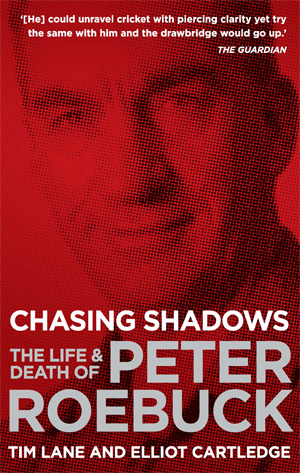 |
||
| ABOUT ME | SOME INTERESTING CRICKET FACTS | BOOK REVIEWS | EVENTS | CONTACTS | ||
 |
Chasing Shadows - The Life & Death of Peter Roebuck - Tim Lane and Elliot Cartledge
|
|
The book, written by two Australian journalists, about the late renowned cricket writer, Peter Roebuck, tries to unravel the many mysteries that marked his life and death. Known as a first-class player in England, Roebuck was an enigma: a cricketer, cricket commentator and philanthropist, who rose to fame internationally as a writer and broadcaster. His untimely death stunned many. Investigations by Tim Lane and Elliot Cartledge have provided a detailed and balanced account, previously unknown to the public. The main characters were interviewed by the authors. The list included an unknown former girlfriend, family members apart from the complainant linked to the circumstances of Roebuck's death. In an excellent tale that spans multiple continents, an uncompromising investigation and unflinching testimonies from the likes of Steve Waugh, Rahul Dravid, Mike Atherton, Gideon Haigh, Ian Chappell, Jonathan Agnew and members of the Roebuck family, Tim Lane and Elliot Cartledge have pieced together the fragments of an often brilliant yet uneasy life – and reveal how it all unravelled. Of all the issues on which Peter Roebuck would write over a thirty-year period, there was none he was more passionate about than race, according to the authors. "He had staunchly opposed sporting links with South Africa during the boycott years, and when apartheid fell and South Africa's cricket team returned to the stage, he declared that he regarded the nation's previous history in the sport as null and void. Roebuck's views on race and racial discrimination extended well beyond southern Africa. To the consternation of certain media peers, he argued vehemently that cricket's non-white nations were unjustly targeted in regard to suspect bowling actions. He was seen to back teams from the subcontinent on issues such as on-field behaviour." The authors believed Roebuck's life was perplexing. His end came at the age of 55 after falling from the window of a Cape Town hotel in 2011. According to them the circumstances of his death are disconcerting, baffling. Many troubling questions still outnumber answers. Why did such deep-seated and interminable antipathy linger between Roebuck and certain influential figures? He'd created the impression he was estranged from his family - why? The man who made the damning complaint of sexual assault disappeared without trace - how? What caused South African police to so quickly label the death as suicide? Why haven't results of forensic tests been released? Why was the inquiry into his death conducted furtively? Is there evidence of other forces at play, darker forces whose failings Roebuck in his life had exposed? A regular contributor to The Hindu and Sportstar and other international publications, Peter Roebuck had covered cricket elegantly. The authors, by dint of research, have assembled an excellent book - one of the best cricket books - published last year.
|
||
Home | About | Cricket Facts | Book Reviews | Events | Contacts | Sitemap | Disclaimer
© Rajesh Kumar 2010 all right reserved